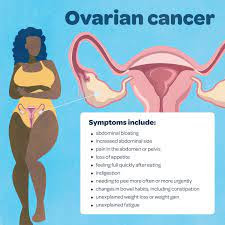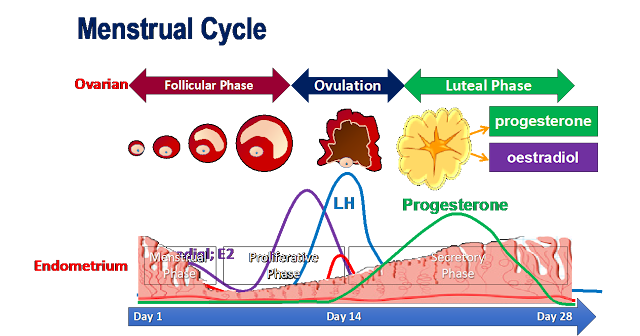Ovarian Cancer Symptoms That Every Woman Should Know

Ovarian cancer is a disease in which cancer cells form in the tissues of the ovaries. the ovaries are two almond-shaped organs located on either side of the uterus. they produce female hormones and eggs ovarian cancer is hard to detect in. its early stages and can spread quickly ovaries contain many small glands that produce and release an egg each month during a woman's menstrual cycle the ovary also produces female hormones.
Ovarian cancer about six percent of women will develop ovarian cancer in their lifetime. that's about one out of every 78 women. ovarian cancer is more common in older women. and among those who have never been pregnant, or who haven't had children.
The American Cancer Society reports that around 22,000 new cases of ovarian cancer. were diagnosed in 2021 and almost 14,000 women lost their lives. ovarian cancer accounts for about two percent of all cancers among women in the United States the good news is that many women with ovarian cancer can be cured. but you need to get treatment as soon as possible. after symptoms begin ovarian cancer often has no early symptoms until it's too late for treatments to cure.
.jpg)
It most women that are diagnosed, don't have any symptoms until their disease is advanced on average. the five-year survival rate for ovarian cancer is about 35 percent. the survival rate depends on many factors including how advanced the disease is. when it's diagnosed a person's General Health and whether they choose surgery or chemotherapy as their primary treatment method.
Ovarian cancer is most common in women over age 63. but it can occur at younger ages family history also plays a huge role in the formation of tumors in the ovaries. if a close family member has had ovarian cancer your risk is higher than average.
If two or more family members have had. it your risk is even higher fortunately. there are many early symptoms that can signal the presence of ovary cancer. but to better understand these symptoms let's take a look at the types of ovarian cancers.
There are three types of ovarian cancer, the most common form of this cancer is epithelial ovarian cancer. this type accounts for about 90 percent of all ovarian cancers. and it begins in the cells that line the surface of the ovary germ cell ovarian cancer.
However, is less common germ cell tumors start before birth or very soon after. so they can be found in Children and adolescents. these tumors account for about eight percent of all ovarian cancers. but most cases occur in women in their 40s, the rarest type of them all is stromal ovarian cancer.
Which accounts for two percent of women diagnosed with ovarian cancer. this type of cancer is mostly common in late adolescents. and early adulthood but since ovarian cancer is often diagnosed at an advanced stage. it is not always possible to identify the symptoms. However some symptoms are common in early ovarian cancer cases.
Frequent Bloating
Frequent bloating of the most common signs of ovarian cancer is a feeling of bloating on a regular basis. this can be accompanied by pain in the lower abdomen. which is often mistaken for menstrual cramps some women may also experience constipation or diarrhea. although it's normal to feel bloated after eating some women experience this sensation more frequently than others.
If you are experiencing bloating that's accompanied by pain or other unusual symptoms. it's important to see your doctor to rule out ovarian cancer as soon as possible.
Lower Back Pain
Lower back pain in the lower back or pelvis is often one of the first signs of ovarian cancer. it may be worse after periods or bowel movements. and it can be persistent or come and go pain in the pelvis or abdomen usually spreads to the groin area. the pain may be constant or come and go.
But it may feel like a dull ache rather than sharp pain. it may worsen with exertion such as coughing sneezing or lifting heavy objects number three constipation.
Constipation Constipation
Constipation constipation is a common symptom of ovarian cancer constipation occurs. when stool in the colon becomes hard and dry due to a lack of water. and fiber this may be due to the tumor putting pressure on the colon or rectum.
.jpg)
The tumor may also cause the muscles in your intestines to contract. which can make it difficult for stool to pass through stool changes related to ovarian cancer include having less frequent bowel movements than usual feeling bloated or full after eating straining. when trying to have a bowel movement and having fewer normal bowel movements than usual.
Fatigue
Fatigue ovarian cancer symptoms can include fatigue. the fatigue often comes on gradually and may be accompanied by other ovarian cancer symptoms such as loss of appetite, bloating and indigestion. the symptoms of ovarian cancer are vague and not specific enough to bring about a diagnosis. many women attribute their symptoms to stress or aging as a result most wait too long before seeking treatment for ovarian cancer.
Pain Or Discomfort Pain In The Abdomen Or Pelvis
The abdomen or pelvis another common symptom of ovarian cancer is abdominal pain. the cancer usually does not cause any pain in these areas until it has developed Advanced stages the level of pain can vary widely. and many people with ovarian cancer don't even realize they have it until they're diagnosed at stage three or four the this is why regular screening tests are important as they can detect the disease before symptoms appear.
Quickly Feeling Full When Eating
Many women feel full after a meal. and can't eat more than half of what they usually would some feel sick. if they eat too much they also may have diarrhea nausea and vomiting after eating feeling full quickly. or bloated for no reason are common signs of an enlarged stomach caused by fluid buildup from an ovarian cyst or tumor pressing on nearby organs or other structures in the abdomen.
A Frequent
The most common symptom of ovarian cancer is a frequent urgent need to urinate. this can be caused by an enlarged pelvic tumor pressing on the bladder or ureter. which is the tube that connects the kidneys and bladder While most women do not experience frequent urination before being diagnosed with ovarian cancer. it's still important for women to pay attention to these symptoms as well as other changes in bowel habits.
Menstrual Cycle
The symptoms of ovarian cancer vary from woman to woman. and some women don't have any symptoms at all many doctors recommend women get screened for ovarian cancer starting at age 35.
But it's important to know what symptoms you should be looking for a change in the menstrual cycle is one sign of ovarian cancer that many women don't give a lot of attention to it's common to have an irregular menstruation cycle while approaching menopause to. But it's also safe to talk to a doctor when this happens.
Difficulty Eating Many Women
Difficulty eating especially those who are busy or stressed often experience. nausea and an upset stomach while occasional difficulty eating is nothing to worry about it can be a sign of ovarian cancer ovarian cancer is often an Insidious disease, as it may not cause any difficulty eating until it has spread to other organs in its early stages ovarian cancer does not usually present with such a symptom diagnosing ovarian cancer Diagnosing ovarian cancer ovarian cancer usually grows slowly and can take years to develop into an advanced stage the earlier you're diagnosed the better your chances are for treatment success especially when it comes to curing rates the first step in diagnosing ovarian cancer is an abdominal ultrasound the doctor uses a probe that emits sound waves to create images on the inside of your abdomen the doctor will also do a pelvic exam and possibly a CT scan.
The CT scan can be used to look for tumors in the ovaries and other organs nearby including the colon bladder and rectum. if the doctor suspects cancer they may be recommendingan MRI pet scan or biopsy a biopsy is when tissue samples are taken from suspicious areas in your body and examined under a microscope by a pathologist treatment for ovarian cancer.
Treatment for ovarian cancer treatment options vary depending on the stage and type of a woman's ovarian cancer surgery is often used to treat early stage cancers for advanced stages chemotherapy and hormonal therapy are used along with surgery.
Surgery to remove an ovarian tumor is called ab laborotomy depending on the location and size of the tumor your doctor May perform a laparoscopic or robotic approach to removing your ovaries during a laparotomy your surgeon makes a long incision in your abdomen usually horizontally this allows them to access the organs inside your abdomen and remove any tumors found there.
If you have cancer that has spread beyond the ovaries into other parts of your body such as the lymph nodes this procedure may be used to surgically remove those areas as well but if all evidence of cancer has been removed there's no need for further treatment chemotherapy may be used to shrink a tumor before surgery or it may be used after surgery to kill any remaining cancer cells.

It's also given after surgery to help lower the risk of ovarian cancer coming back chemotherapy can be used alone or with other treatments for ovarian cancer. it is often used with radiation therapy to treat ovarian cancer that has spread to other parts of the body The Five-Year survival rate for women with early stage ovarian cancer is 92 percent for women with Advanced stage disease The Five-Year survival rate is about 17 percent hopefully reproductive cancers like ovarian cancer will be much less of a threat in the future until that day comes.
There are steps you can take to improve your chances for early detection the earlier. it is detected the better your odds are of beating the disease so never hesitate to ask questions about symptoms or risks when visiting your doctor.




.jpg)


.jpg)

.jpg)

.jpg)


.jpeg)
No comments:
Post a Comment